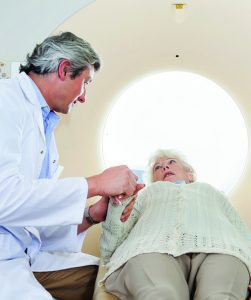 CT Lung Screenings
CT Lung Screenings
The most common type of cancer in men is prostate and in women it’s breast cancer. The second leading cancer in both men and women is LUNG CANCER. According to the American Cancer Society’s Statistics, there will be 224,390 new cases of lung cancer diagnosed and 158,080 deaths from lung cancer this year. Despite these grim statistics, nearly 430,000 people today, have at some point in their lives been diagnosed with lung cancer, and yet they are alive and well with zero remission. This is predominantly because it was caught early through lung cancer screenings.
There are three main types of lung cancer:
• Non-Small Cell Lung Cancer
• Small Cell Lung Cancer
• Lung Carcinoid Lung Cancer
Non-small cell lung cancer (NSCLC) is the most common type, affecting nearly 85% of those with lung cancer. Fortunately, this form of carcinoma usually grows at a slower rate. There are three subsets that makeup NSCLC, Squamous, adenocarcinoma and large cell.
Small Cell or oat cell cancer affects nearly 10% of the lung cancer population and spreads very rapidly.
Lung Carcinoid affects about 5% of those with lung cancer. It grows very slowly and rarely spreads.
Inappropriately, the stereotype that often coincides with a lung cancer diagnosis is that patients are assumed to have smoked. But, the stark reality is that many cases of lung cancers are diagnosed in patients that have never smoked a day in their life.
Non-smokers that have lung cancer are usually identified as those that have been exposed to environmental carcinogens like, cleaning products, diesel exhaust, radon gas, asbestos or those with genetic mutations. Research suggests that screening a high-risk population for lung cancer can drastically reduce the number of mortalities from this disease.
Screening via a CT scan of the chest
CT scans are advantageous in identifying and screening for lung cancers. If lung cancers are found in the early stages, the treatment options and outcomes are much more successful. Because CT scans can detect very small masses in the lungs, by detecting cancerous tumors at an early stage, an individual’s survival rate may be significantly improved.
Lung cancer screenings are very important for smokers and former smokers, especially those 55-75 years of age. This is due to the prevalence of lung cancer seen in this population. The screenings are also vital for individuals exposed to carcinogens, or those that show signs and symptoms of lung disorders.
Given the advantages of having lung screenings with CT scans, due to the higher resolution and ability to detect very tiny cancer cells, there is a proven reduction in lung cancer related deaths compared to those patients who are tested with X-ray.
Naples Diagnostic Imaging Center
At Naples Diagnostic Imaging Center (NDIC), all of their CT technologists are board certified and trained on the highest standards for Lung CT screenings.
The Radiologists at NDIC are fellowship trained with subspecialties in Neuroradiology, Musculoskeletal, Interventional, Nuclear Medicine and more. They provide precise, on-site, analysis and thorough readings for referring physicians. The proven success rate at NDIC is clear and can make all the difference in your diagnosis and treatment options. Not only are they experts in radiology, but with 3 locations to serve you in the Naples area, NDIC is also convenient.
Naples Diagnostic Imaging Center
NDIC Plaza
311 Tamiami Trail N., Suite 104,
Naples, FL 34102
NDIC North
1715 Medical Blvd.
Naples, FL 34110
NDIC East
6400 Davis Blvd., Suite 101,
Naples, FL 34104
NDIC Diagnostic Services
• Mammography
• Osteoporosis screening (DEXA)
• Diagnostic Radiology
• Ultrasound
• CT
• P.E.T. (Positron Emission Tomography)
• MRI
• Nuclear Medicine
To find out more about Naples Diagnostic Imaging Center, please visit their website at www.naplesimaging.com
For information, please call:
(239) 593-4200
For appointments, please call:
(239) 593-4222









